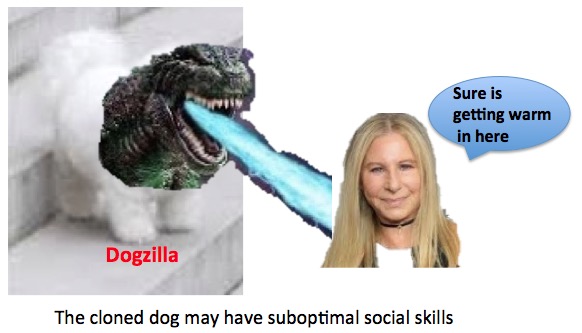Barbra Streisand cloned her dog. Blah blah. It's all over the place. But has anyone stopped to consider what might go wrong? After all, if Streisand is afraid of biotechnology, specifically the genetic modification of foods, a relatively simple process, perhaps she is unaware of the potential dangers she faces inviting an alien species onto the couch. Who knows what perils may lie within the genes of Foofie. Make that two Foofies (1).
So, it's a damn good thing that the American Council exists to set the record straight.
While GM technology and dog cloning are very different, both processes involve the transfer of genetic material from one cell to another. In the case of cloning, the new animal is genetically identical to the parent, but, although the cloned pet will look like the parent, the dogs' appearances won't be identical. Let's look at what the FDA has to say about cloned pets.
Myth: Clones are always identical in looks.
Not necessarily. In fact, many clones have slight variations in coat color and markings.
Myth: Clones have exactly the same temperament and personality as the animals from which they were cloned
Temperament is only partly determined by genetics; a lot has to do with the way an animal has been raised. It’s the old “nature versus nurture” argument.
What else might go wrong? According to the Siberian Times, when Dr. Hwang Woo Suk. a South Korean cloning expert cloned three sniffer dogs for Russian police forces, things didn't work out so well.
"One of them failed to perform any task. Immediately, it lay down because of the cold. The second dog was slightly better, but completed only 50% of tasks. They are not adapted to our harsh conditions, they are smooth coated, cannot withstand frost."
Aleksey Kolmogorov, deputy head of the canine service of the Ministry of Internal Affairs, Yakutsk, Russia

The Siberian Times. 10 January 2017
OK, it should be clear by now that if you're scared of gene manipulation that you really ought to be afraid of the dogs too. Although the following scenarios are somewhat unlikely, you can't be too careful nowadays.
1. APPEARANCE

2. TEMPERAMENT

3. CROSS CONTAMINATION WITH MONSANTO GM CORN
OK, this is admittedly far-fetched, but no more so than anything that comes out of the mouths of Joe Mercola, Mike Adams, or David Avocado Wolfe. Here is a sequence of events, albeit unlikely, that should scare the hell out of Streisand.


Here's a better idea: Go to an animal shelter. There are way too many homeless animals. My mother, who is 91, volunteers at an adoption center. She will happily help you find your own Foofie.
Marge Bloom. (Left) Professional photo for an ad campaign to encourage people to adopt dogs. (Right) Standing next to herself at a phone booth.
NOTES:
(1) Yeah, I know, Neither dog is named Foofie. I just took some genetic license. The real names are worse.




